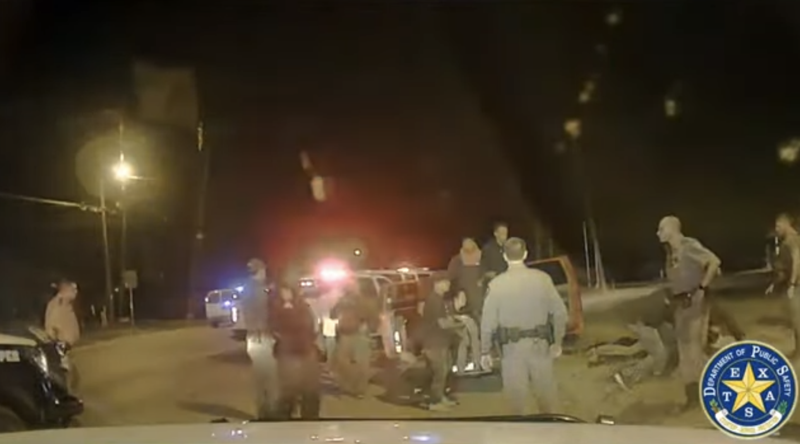(The Center Square) – Misreporting about cartel crime in Liberty County indicates a fundamental misunderstanding about how Mexican cartels and gangs operate in Texas, law enforcement officials tell The Center Square.
Multiple news outlets reported this year that the county was a cartel haven with out-of-control crime. While there is crime there, a Texas Department of Public Safety investigation refuted the media reports.
At a state legislative hearing this fall, DPS Director Steve McCraw pointed to a bigger problem, saying, “There’s not a community in Texas that’s not impacted by the Mexican cartels and gangs.” McCraw reiterated what Texas sheriffs have told The Center Square: “where there’s cocaine, heroin, methamphetamine, fentanyl … all communities are impacted by” cartels, and gang influence is there.
Goliad County Sheriff Roy Boyd, who heads an Operation Lone Star Task Force encompassing multiple counties, told The Center Square, “There’s not a county that does not have some level of cartel presence.” If a county has “dope or slave labor,” referring to human trafficking and forced labor, he said, “you’ve got a cartel problem or an organized crime problem.”
He also said, “It doesn’t seem like people understand how these organizations function,” referring to the cartels. “You might have four cartels in a metro area like Houston. But in rural counties, people who are several layers down, are actually subcontractors working for people who work for the cartel. A lot of people will think they are cartels themselves but they aren’t. Cartels aren’t going to coexist in a small geographic region without issue. In Houston, that’s possible because there’s millions of people living there.”
Boyd also questioned widespread attention on Liberty County that ignored Harris County, the largest county in Texas, which is believed to be the largest cartel hub in Texas.
“The primary focus in Texas outside of the border has to be Houston because Harris County is the hub for the slave trade and drug trade for the entire eastern half of the United States,” he told The Center Square. “Harris County is the distribution center. Without Houston, most of the illegal product would not have a place to go.”
Boyd said it’s imperative that the state legislature pass a bill that creates a Division of Texas Homeland Security “because there needs to be an entity within state government that focuses on organized crime. Not just Mexican cartel crime, but the CCP, North Korea, Syrians or any other organization. Houston is inundated with foreign criminal organizations and there needs to be someone responsible to go after them.”
San Jacinto County Sheriff Greg Capers told The Center Square he’s identified operatives in his county working for the Zetas, Sinaloa, CJNG and the Gulf cartels. He also said sheriffs north, west, south, and east of Houston “are all fighting the same thing:” cartel influence and crime coming from the southern border.
Capers has led two of the biggest raids in Texas. In May 2015, he led a multiagency effort to shut down an illegal gambling ring stretching across multiple states. He also was the incident commander leading a multiagency effort in May of this year, which successfully apprehended a murderer on the loose. His operation caught a Mexican national illegally in the country who killed a Honduran family in his county.
“We could replicate these operations if we had the funding,” he told The Center Square.
Boyd hopes to expand his OLS Task Force to target areas closer to Houston, with Capers leading it. Capers has for years tried to create multi-jurisdictional task forces to target human trafficking operations in and around Houston, hitting funding or bureaucratic roadblocks, he said.
Kinney County Chief Deputy Sheriff Armando Garcia, who worked in the Uvalde County Sheriff’s Office for decades and is now running for Uvalde County sheriff, also worked on DEA and FBI task forces targeting organized crime and gangs. At one point, he successfully dismantled the Mexican Mafia and Texas Syndicate in Uvalde County. After he left, he said, “drugs and gangs in the county are out of control. So many young kids are getting involved. Something else is going to happen if someone doesn’t step up and do something about it.” He’s hoping to turn that around.
Former Border Patrol agent and U.S. Department of Homeland Security investigator Steve Greenwell, who’s running for sheriff in Lavaca County, told The Center Square, “We have cartel surrogates in our county. We have intelligence operatives on the ground in our county gathering information to benefit cartel activities. They are very sophisticated, organized and determined to facilitate an extensive illicit criminal enterprise. Cartel influenced activity in our county is impacting our everyday safety and security.”
Greenwell earlier sounded the alarm after enough drugs were seized in one traffic stop in Lavaca County to kill its entire population twice over.
“What’s more troubling is what isn’t being caught,” he said.
“All contraband smuggling, whether it be people, drugs, weapons or money, is conspiratorial in nature,” he said. “Multiple people are involved in getting drugs from the border to Houston, and they come straight through our county. Our job in law enforcement is to follow all the leads going back to the border, which includes going back over years worth of crimes. This requires interagency interdiction efforts that match the sophistication of the cartels’ networks.
“If we don’t start pushing back real soon, we’re done. The battle is local, statewide.”







